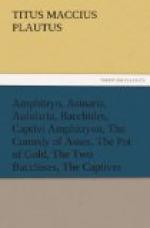Erg.
Tuom gnatum et genium meum.
Your son and my guardian angel.
Hegio
Et captivom illum Alidensem?
And that Elean prisoner?
Erg.
+Ma ton Apollo:.+
Oui, par Hercules!
Hegio
Et servolum
880
meum Stalagmum, meum qui gnatum surripuit?
And that miserable
slave of mine, Stalagmus, that kidnapped
my son?
Erg.
+Nai tan Koran.+
Oui, par Hercul-aneum!
Hegio
Iam credo?
I’m to believe that?
Erg.
+Nai tan Praineste:n.+
Oui, par Pompeii!
Hegio.
Venit?
He’s come?
Erg.
+Nai tan Signian.+
Oui, par Sorrento!
Hegio
Certon?
You’re sure?
Erg.
+Nai ton Phrousino:na.+
Oui, par Amalfi!
Hegio
Vide sis.
Careful now!
Erg.
+Nai ton Alatrion.+
Oui, par Torre dell’Annunziata!
Hegio
Quid tu per barbaricas urbes iuras?
What are you swearing by foreign cities for!
Erg.
Quia enim item asperae
sunt ut tuom victum autumabas esse.
Well, because
they’re the same as you said your meals were—
perfect terrors.
Hegio
Vae aetati tuae.
Plague take you!
Erg.
Quippe quando mihi nil credis, quod ego
dico sedulo.
sed Stalagmus quoius erat tunc nationis,
cum hinc abit?
My sentiments
exactly, seeing you don’t believe a word I
tell you in sober
earnest. Stalagmus, though,—what was
his
nationality when
he disappeared?
Hegio
Siculus.
Sicilian.
Erg.
At nunc Siculus non est, Boius est, Boiam
terit:
liberorum quaerundorum causa ei, credo,
uxor datast.
But he’s
no Sicilian now: he’s a Gaul—he’s
being galled,[G]
anyhow, by that
thing he’s attached to: he’s coupled
with
the article so
as to get children, I suppose?
[Footnote
G: Boia means a woman of the Boii, also a
malefactor’s
collar.]
Hegio
Dic, bonan fide tu mi istaec verba dixisti?
See here, have you told me all this in good faith?
Erg.
Bona. 890




